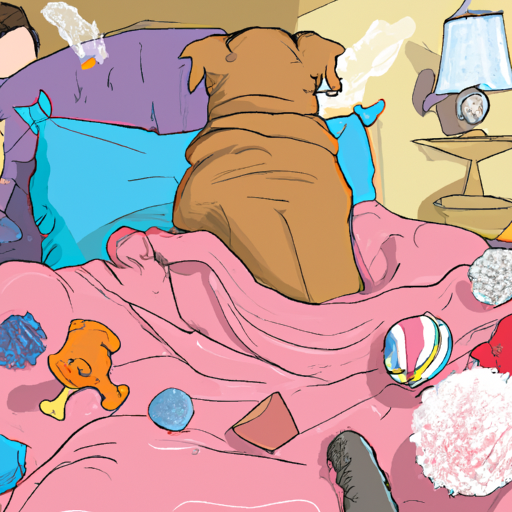Ever had that moment when you’re settling down for a peaceful night’s sleep only to be interrupted by your dog digging relentlessly at your bed? You’re not alone. Many dog owners have been puzzled by this canine behavior. What could possibly compel our canine companions to treat our beds like their personal excavation sites?
This article will deconstruct the reasons behind this seemingly odd behavior, from deeply ingrained canine instincts to temperature control tactics. We’ll explore how dogs use digging behaviors as a way of marking territory and exhibiting nesting habits.
Finally, we’ll provide you with effective tips and tricks to address and manage this behavior in a non-confrontational manner. Understanding why your furry friend is so intent on treating your bed like a construction zone can help improve the quality of life for both you and your pet, while also ensuring peaceful nights ahead.
Canine Instincts Explained
Just like a wolf burrowing into the snow for warmth, your dog’s instinct to dig into their bed is a throwback to their wild ancestry. This behavior is tied closely to their hunting instincts and reflects an innate desire for comfort and security.
Dogs in the wild often dig dens as hideouts or nests, providing protection against predators.
Your dog’s digging might also stem from playful behavior. They might be trying to expend energy or simply enjoying the texture of the bedding beneath their paws. If they persistently dig at one spot, it could indicate they’re trying to make that area more comfortable or marking it as their own territory.
Understanding these behaviors can help you meet your pet’s needs better while maintaining a harmonious living environment with them.
Comfort and Temperature Control
When you notice your furry friend busily pawing at their sleeping spot, it’s likely they’re adjusting it for comfort or trying to control the temperature. Dogs often dig in bed due to a variety of reasons:
-
Bedding Material: Dogs may feel uncomfortable with the texture or firmness of their bedding material and start digging to adjust it.
-
Temperature Control: Similar to how humans fluff pillows, dogs can dig in bed as an instinctive method to regulate body temperature.
-
Canine Anxiety: Digging can be a sign of stress or anxiety in dogs. It serves as a coping mechanism that provides them some relief.
-
Creating a Safe Space: By digging, dogs are creating what they perceive as a safe haven.
Understanding these behaviors will help you better cater to your dog’s needs and comfort level.
Marking Territory
Interestingly, it’s not just about comfort or temperature control; your canine friend is also likely marking their territory. In fact, a study by the American Kennel Club reveals that nearly 60% of a dog’s natural behavior involves some form of territorial marking.
This action is less about destruction and more about creating an environment that feels safe and secure. When dogs dig in bed, they are often establishing what professionals call ‘Canine Privacy.’ Just like humans, dogs desire personal space where they can relax undisturbed. Digs on the bed allow them to create this private zone.
Furthermore, your pet uses scent communication to mark its territory. Your dog has scent glands in its paws which release pheromones when digging, transmitting a clear message: ‘This spot is mine!’ The bed then becomes imbued with their unique odor, reinforcing their claim over it.
Nesting Behavior
Beyond marking territory, another significant reason your furry companion might be making a mess of the sheets is due to innate nesting behavior. This behavior is deeply ingrained in many breeds and can be traced back to their wild ancestors. Nesting allows dogs to feel safe and secure in their environment, which is why they may dig at your bed before settling down for a nap.
Interestingly, certain breeds are more prone to this behavior than others due to breed specificity. For example, Terriers were bred for digging and burrowing, so they often demonstrate this natural tendency more than other breeds.
Moreover, maternal instincts play a role as well. Female dogs preparing for puppies will often exhibit nesting behaviors—digging around in an attempt to create a safe place for her future offspring.
Addressing the Behavior: Tips and Tricks
Dealing with these nesting behaviors can be challenging, but it’s not impossible; there are strategies to curb their tendencies, maintain your sheets’ integrity, and ensure their comfort simultaneously.
-
Behavioral Training: Engage in consistent training to discourage unnecessary digging. Use positive reinforcement when they show restraint.
-
Provide Pet Beds: Offering comfortable pet beds may deter dogs from digging into yours.
-
Playtime Alternatives: Implement regular playtimes as a diversionary tactic to expend energy that might otherwise be used in destructive behaviors.
-
Control Environment: If certain situations or stimuli provoke the digging behavior, try to manage this by controlling the dog’s environment.
While patience is necessary, understanding why dogs dig in bed and addressing it appropriately can lead to harmonious co-existence between you and your furry friends.
Frequently Asked Questions
What kind of diseases can dogs get from digging in bed?
“Dogs can potentially contract parasites through digging in bed, leading to Parasite Transmission. They could also develop Allergic Reactions from dust mites or other allergens present in the bedding material.”
How can digging in bed affect my dog’s sleep quality?
Just as you fluff your pillows, your dog’s digging in bed helps them get comfortable. However, any bedding materials dislodged can cause sleep disruption, potentially impacting their rest and overall health.
Can the dog’s breed influence their digging behavior in bed?
Absolutely, your dog’s breed can influence their digging behavior in bed. Breed characteristics often determine various behaviors, including digging triggers. Some breeds are more predisposed to dig due to their ancestral roles and traits.
What are the psychological implications of dogs digging in bed?
Suppose your dog is excessively digging in bed. It could be an anxiety indicator, signifying underlying stress or discomfort. Frequent behavioral patterns like this should prompt a visit to the veterinarian for professional advice.
Are there any safe toys or tools that can discourage dogs from digging in bed?
Yes, digging deterrents like anti-digging mats or sprays can discourage this behavior. Alternatively, provide alternative activities such as chew toys or puzzle feeders to keep your dog mentally stimulated and curb their bed-digging tendencies.
Conclusion
So, just as you fluff your pillows to get comfy before sleep, your dog digs in bed. They’re heeding their ancient instincts, seeking comfort, marking territory, or creating a safe nest.
To manage this behavior, gently guide them with patient training techniques. Remember, they’re not trying to ruin your linens – they’re simply being dogs. Understanding and respect for their nature will help you both find the sweet spot of cohabitation.



